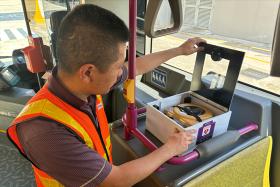Commuter satisfaction up during circuit breaker: Survey
Fewer riders, better cleanliness reasons for higher marks in survey
Fewer riders and stepped-up cleaning of trains and buses during the circuit breaker period made for happier commuters this year.
An online survey conducted by the Singapore Management University (SMU) of about 7,500 people showed "substantial increases" in commuter satisfaction scores from May to July, compared with the same period last year.
While the MRT system scored 66.1 points in the survey in the same period last year, its score rose to 73.4 this year.
Satisfaction with public buses likewise went up from 68.9 points to 74.4 points in the same period.
Scores registered in June and July - after the circuit breaker ended - gradually reverted to last year's levels.
Presenting the results yesterday, Mr Chen Yong Chang, head of research and consulting at the SMU's Institute of Service Excellence, said that with more people returning to work, commuters are asking for more.
"Some respondents are asking for higher service frequency, more crowd control officers and to limit the number of passengers per cabin as trains and buses become more crowded post-circuit breaker," he said.
"To be fair, there's a limit to what operators can do because the crowds have to come back.
"The Government may do more to encourage measures like flexible work arrangements."
While factors such as cleanliness were most important in May, more perennial concerns like service reliability and accuracy of travel information are now also returning to the fore of commuters' considerations, Mr Chen added.
The lack of tourists meant this year's results in satisfaction levels for airports and airlines were not comparable with last year's, with only Singaporeans and permanent residents surveyed in the recent poll.
Still, the SMU survey found that 85.6 per cent of respondents are willing to fly within a year of air travel restrictions being lifted, and that 39 per cent are willing to fly within a month of flights being allowed to resume.
Their top destinations are Australia, Japan, Malaysia and China.
Mr Chen said that with more flights grounded and the travel situation unpredictable, airlines may have to focus more on service and branding rather than flights to be "best poised to capture pent-up demand when passenger numbers rebound".
More immediately, airlines must ensure the ease of refund and the quality of their interactions with customers to retain loyalty, said Mr Chen.
When the land and air sectors were compared, people gave Changi Airport the highest rating at 8.08 points on a scale of 10 when it came to perception of efforts to keep people safe from Covid-19.
Train operators got the lowest rating, at 7.06 points.
Ms Neeta Lachmandas, executive director of the Institute of Service Excellence, said: "This is not surprising.
"The airports are emptier because of the lack of tourists, while the trains are more crowded after the circuit breaker restrictions were lifted."
She added: "When we enter very crowded indoor spaces, we all have a voice in the back of our heads that goes, 'I hope it's safe and I don't catch something'."
Get The New Paper on your phone with the free TNP app. Download from the Apple App Store or Google Play Store now


